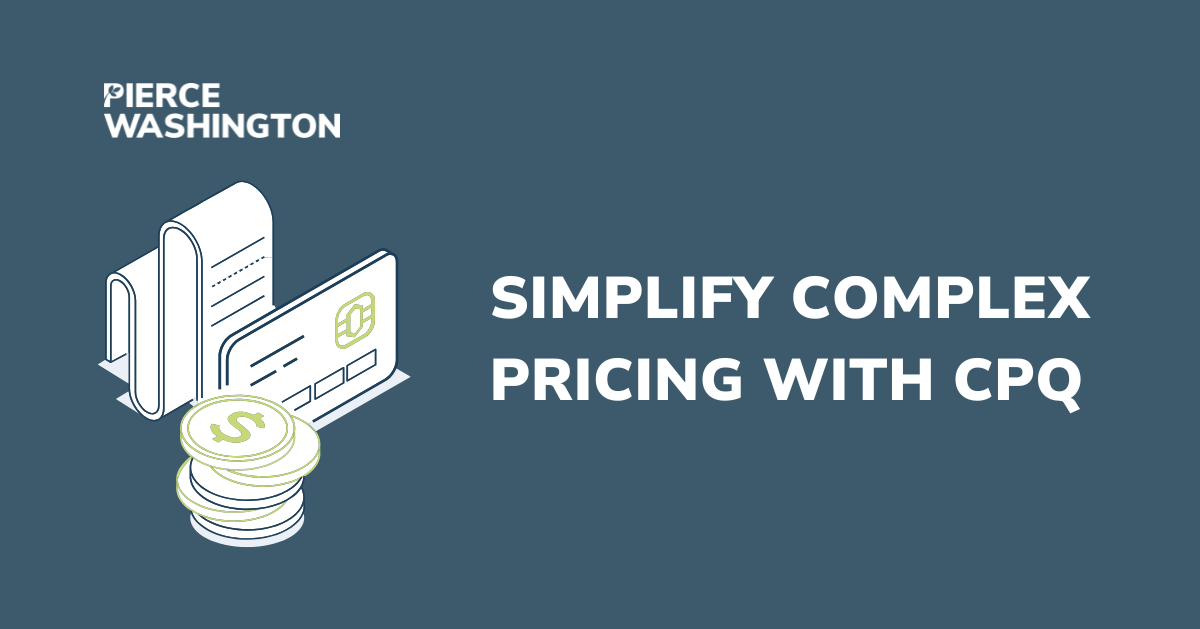Simplifying complex pricing with CPQ
Configure-price-quote software makes spreadsheets, manual processes, and homegrown tools seem prehistoric in comparison.
Pricing complexity is a major challenge for businesses with intricate products and services. Many companies struggle to manage ever-evolving pricing structures, relying on outdated spreadsheets, manual calculations, or legacy systems that limit efficiency and accuracy. Configure-price-quote (CPQ) software transforms this chaotic process with automation, consistency, and strategic pricing capabilities.
The CPQ story is a simple one. It helps companies overcome pricing complexity to drive revenue and profit margins higher.
In industries such as manufacturing, technology, and life sciences, pricing is often not as simple as a fixed product cost. Businesses must account for variables such as material costs, market fluctuations, region-specific pricing, and negotiated customer agreements. Without a systematic approach, these companies risk inefficiencies, pricing inconsistencies, and missed revenue opportunities.
Understanding Complex Pricing
Complex pricing involves multiple factors that influence the final price of a product or service. Businesses often deal with pricing that fluctuates based on various conditions, making it difficult to maintain consistency and profitability. Following are some common pricing complexities that B2B companies encounter.
Configurable Product Pricing. Often, products aren’t static. They’re built or configured based on customer requirements. Each selected component or attribute usually alters the final price, making manual pricing impractical and error-prone.
Market-based Pricing. Prices often change based on real-time factors such as regional demand, material costs, currency exchange rates, and competitive positioning. Companies must continually adjust their pricing to remain competitive while preserving margins.
Subscription and Time-based Pricing. Businesses offering SaaS solutions, leasing agreements, and maintenance contracts face additional complexities, such as prorations, contract renewals, and tiered pricing structures that require sophisticated calculations.
Volume-based Pricing. Companies often provide discounts based on order volume, but managing these tiers manually can lead to errors and inconsistencies, affecting both customer satisfaction and profit.
Multi-tiered Pricing Models. Pricing structures may vary depending on the type of customer, industry, contract agreements, or historical purchasing behaviors, adding another layer of complexity.
Managing Complex Pricing Without CPQ
Businesses without CPQ systems continue to rely on outdated methods that are ill-equipped to handle the dynamic nature of modern pricing, like the following.
Spreadsheets. Many organizations still rely on Excel or Google Sheets to track pricing data. These tools are great at some things, but lack the automation and scalability required for complex pricing structures. Errors, version control issues, and data inconsistencies are frequent and lead to discrepancies (that customers don’t appreciate).
Manual Processes. Relying on sales reps to determine pricing based on experience and intuition rather than data-driven insights creates inconsistencies across teams and regions, and makes scaling pricing strategies difficult.
Homegrown Legacy Systems. Some companies have built custom pricing systems, but they’ve become difficult to maintain. These systems are usually outdated and unable to integrate with modern sales and enterprise resource planning (ERP) tools. The DIY approach often creates bottlenecks and slows down the pricing process.
Tribal Knowledge Dependence. Many companies rely on a handful of experienced employees who “just know” the right price. This approach is risky for obvious reasons and makes the pricing process vulnerable.
Inconsistent Approvals and Discounting. Without automated pricing rules, discount approvals become subjective, leading to uncontrolled price reductions that take a bite out of profitability.
Solving Pricing Complexity with CPQ
CPQ systems eliminate manual processes and enhance pricing accuracy by automating and optimizing pricing structures. Below are examples of how CPQ simplifies pricing complexity while helping businesses push revenue higher.
Automated Pricing Calculations. CPQ ensures accurate pricing by dynamically adjusting for configurable components, regional pricing variations, customer-specific agreements, and real-time market data. This automation removes the need for sales reps to calculate prices manually.
Centralized Pricing Rules. CPQ centralizes all pricing rules, ensuring uniformity across different systems, sales teams, business units, and geographies. This reduces the chance of pricing inconsistencies and errors.
Integration with ERP and CRM Systems. By connecting with ERP and customer relationship management (CRM) systems, CPQ ensures seamless data flow between pricing, quoting, and order management processes.
Guided Selling for Sales Teams. CPQ offers intelligent recommendations for pricing and bundling, helping sales reps create the most competitive and profitable quotes—on the spot.
Dynamic Market-driven Pricing. CPQ enables businesses to update pricing in real-time based on changing market conditions, competitive insights, and internal profitability targets.
Approval Workflows. Automated approval workflows ensure that discounts and special pricing requests follow established guidelines, eliminating unauthorized discounts and protecting your profitability.
Distilling the Key Takeaway: CPQ is essential for businesses with complex pricing, especially B2B companies in manufacturing, tech, and life sciences.
Trusting Pierce Washington with Your CPQ Transformation
Implementing CPQ successfully requires deep industry expertise, strategic planning, and seamless integration with existing systems. Pierce Washington has 20 years of hard-earned and specialized experience. We help B2B enterprises transform their pricing models, streamline quoting processes, and unlock new revenue opportunities.
Our comprehensive approach to CPQ implementation begins with an in-depth assessment of your current pricing structure and inefficiencies. Then we tailor a CPQ platform to your unique and specific needs. This ensures a smooth transition from any legacy systems and processes to a fully automated and scalable pricing model, that you’ll love.
Your new CPQ, integrated with existing ERP and CRM systems, will ensure a seamless data flow across your organization. It will provide welcomed real-time insights and analytics to optimize and modernize your pricing structures. And, ultimately, your CPQ will drive newfound efficiency and profitability.
Pierce Washington is the ideal partner for your revenue transformation. We’re hands-on with training and change management to help your team quickly adapt to and successfully adopt CPQ. So, your business can implement an intelligent and more profitable pricing strategy.
